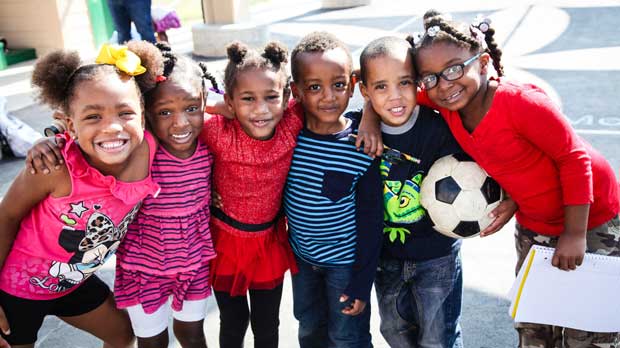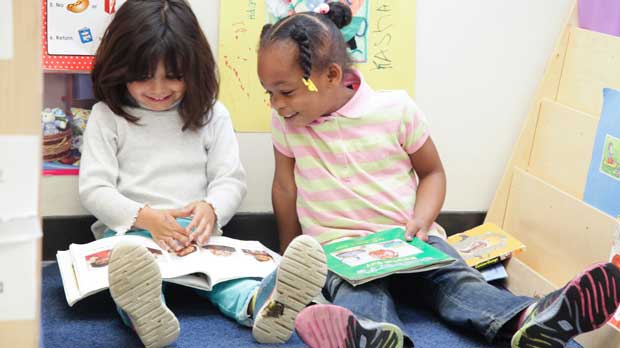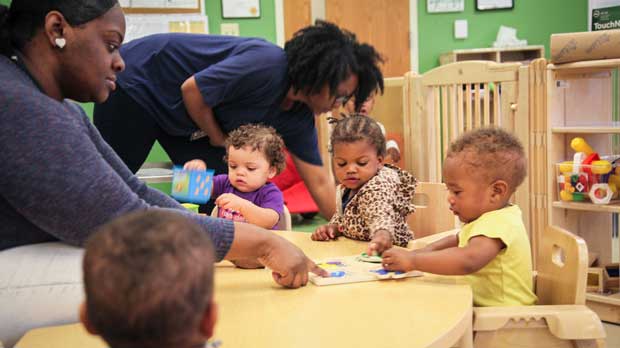
By Alexandra Fradelizio | m/Oppenheim Media Writer
According to the Vogel Alcove website, approximately 3,000 Dallas children sleep on the streets or in homeless shelters every night. As a result of not being able to live in a safe family environment, many preschool-aged children are unprepared to succeed when they enter kindergarten. Vogel Alcove provides a full array of services to “help homeless children overcome the lasting impact of trauma” that can be faced when living in unstable surroundings, stated the organization’s President and Chief Executive Officer Karen Hughes.

Working exclusively with homeless toddlers and preschoolers, the organization offers an accredited early childhood program to 200 children per year in order to help them prepare for kindergarten. For parents who are enrolled in school or are working, childcare is offered within Vogel Alcove’s facilities. The majority of participants are single mothers who live in domestic violence shelters, transitional housing centers, or emergency shelters with their children, so Hughes and her staff work to provide consistency during a difficult period in their lives.
“It’s really our vision that every child has a home, a self-sufficient family, and a successful foundation for being successful in school,” explained Hughes.
All of Vogel Alcove’s programs seek to combat the trauma faced by their young participants. Many of the children display developmental delays and behavioral issues, so the organization offers a variety of social and emotional services, including speech, occupational, and physical therapy sessions. Additionally, the staff of Vogel Alcove regularly takes participants on field trips to the local library, gym, or garden. The programs are designed to not only prepare children for kindergarten and beyond but also place them on par with their future classmates who have not faced trauma.

As much as the organization helps children, Vogel Alcove equally provides services tailored to their parents. Emotional counseling, education services, and career opportunities assist the adults as they recover from their traumatic pasts. In many cases, the parents who are referred to the organization’s programs from shelters or transitional housing centers are part of multigenerational cycles of homelessness and often face similar behavioral issues that affect their children. Hughes explained that upon entering Vogel Alcove, the majority of parents continue to feel as though they are in a state of survival and will attempt to quit when facing relatively small obstacles. For instance, when one adult participant experienced a minor issue with her car while in transit to her job, she believed that quitting and ending her career was her only option. Instead, after speaking with staff from Vogel Alcove, a mechanic was able to fix her car, and she remained committed to her job. Because those who face trauma can become easily overwhelmed in many daily situations, the staff provide comfort and encouragement to help the parents persevere.
“It seems like small things but they’re huge when it comes to what keeps people going,” said Hughes of the challenges faced by the parents.
“We work with them on how to create networks for them to be supported in the community.”
Despite all the support that help parents and their children thrive, Hughes acknowledges the challenges in serving a transient population. Many of the families served continually leave and return to Vogel Alcove, and while the average child stays in the organization for about 16-17 months prior to beginning kindergarten, some are unable to stay for the desired amount of time.
“We have a window of opportunity to make an impact on their lives,” explained Hughes.
Prior to joining Vogel Alcove, Hughes studied early childhood development and began her career as a kindergarten teacher and a director of a child center. She then proceeded to serve as the Chief Operating Officer for the National Association for the Education for Young Children in Washington, DC and was eventually recruited to lead a nonprofit in Virginia where 1,500 children were helped through the organization’s work. Seven years ago, she became part of Vogel Alcove and has remained committed to improving the lives of young children throughout Dallas.

In the last four years, Vogel Alcove has doubled its capacity and is now serving over 200 children. Due to the increased need for services, the organization recently received a grant from the basketball team the Dallas Mavericks to renovate the family center and add more two-generational programming. Additionally, more job opportunities and training for parents is scheduled to be added to the vast array of programs.
Above all, Vogel Alcove remains committed to doing whatever it takes in assisting children and their parents overcome trauma in order to begin a new chapter in their lives.
Learn more about Vogel Alcove and Donate.
